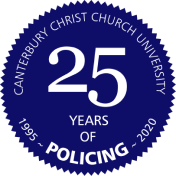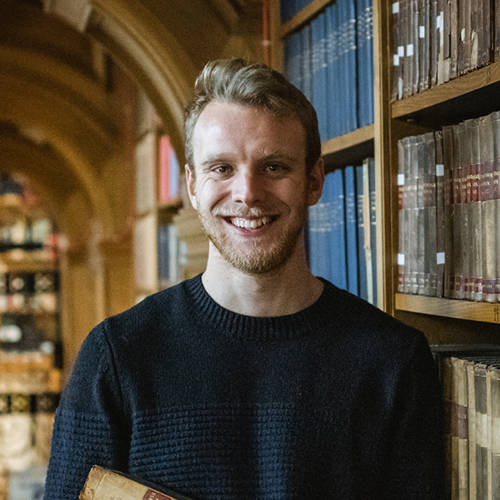Overview
Explore how crimes are investigated and justice is delivered on our BSc Criminal Investigation degree. Designed to provide a solid foundation in police investigative practices, this course looks into the complexities of modern crime and the justice system.
You'll explore everything from day-to-day investigations to major and complex cases. You’ll also examine the influence of the media, public perception of policing, and the challenges modern detectives face. You'll gain real experience through simulated interviews and investigative scenarios, including the opportunity to work on a miscarriage of justice case with our partner charity, Inside Justice.
What you’ll learn
- Examine how criminal investigations are shaped by law, media, and public perception.
- Investigate real-world case studies, including major crimes and historic cases of abuse.
- Interview witnesses and suspects in our policing simulation suite using professional techniques.
- Explore the full process of investigation, from gathering evidence to building a case.
- Present findings on a potential miscarriage of justice to our partner charity Inside Justice.
Whether you want to pursue a career in policing, criminal law, intelligence, or investigative journalism, this course builds the practical knowledge and skills employers are looking for. With a focus on critical thinking, real experience, and professional development, you’ll graduate ready to make a difference.
We know employers are looking for dynamic, open-minded graduates who can adapt, innovate, and collaborate. So, we have designed a new way of teaching and learning to ensure that you are work-ready for when you graduate.
Why study Criminal Investigation at CCCU?
- Select your qualification
- Select your grade
- Add it and repeat
Accepted qualifications
We accept a wide range of general qualifications that attract UCAS Tariff points either on their own or in combination with others. Below are some common examples.
| Qualification | Grades |
|---|---|
| A Levels | BBC |
| BTEC | DMM |
| Access | 15 Distinctions and 30 Merits |
| International Baccalaureate | 29 Points |
The grades in this table provide an indication of what is required to study this course. If you have qualifications that are not present in the table or want to tell us more about you specific situation then please contact our friendly Course Enquiry Team.
Don’t meet these entry requirements?
If you do not meet these entry requirements, a foundation year is a great way of beginning your university journey. We recommend you speak to our Course Enquiries team who will advise on a route to study that fits you.
More information
Contact us
Module information
We know employers are looking for dynamic, open-minded graduates who can adapt, innovate, and collaborate. So we have designed a new way of teaching and learning to ensure that you are work-ready for when you graduate. Alongside the modules below you will choose from our new curriculum that will help you achieve student success, engage with contemporary topics and work with industry or the community.
As well as the core modules, you will also have the opportunity to study a number of option modules. The availability of specific option modules may vary from year to year. This will be subject to a minimum number of students choosing the module and staff availability. It means we cannot guarantee the availability of a particular option module. However, we will ensure you have a choice of option modules.
Core/optional modules
*Modules subject to approval
How you’ll learn
The academic year is divided into two semesters. In the first year, you will be given the opportunity to settle into University by undertaking three ‘microcredential’ modules right at the beginning of the year – you will be able to choose which ones you do. You will then do two more modules in each semester. In Year 2, you will do two modules in each semester. In Year 3, where we offer you optionality to specialise, you will undertake three modules in the first semester and two modules in the second semester.
You will be taught through a combination of lectures, seminars and practical workshops. You will typically have around 12 contact hours per week. However, your actual contact hours depend on the option modules you select and specific activities prepared for you.
Seminars in smaller groups will enable you to discuss and develop your understanding of topics covered in lectures. We have made sure that teaching is not only done in a classroom setting and you will take part in practical exercises throughout this course. In addition, you will meet with your personal academic tutor (PAT), who will be able to assist you with any queries or problems that you may have. They will also be able to signpost you to any of the University services should you need them.
When not attending lectures, seminars, workshops or other timetabled sessions you will continue learning through self-study. This involves keeping up to date with current affairs, reading journal articles and books, undertaking research in the library, working on projects, and preparing for coursework assignments/examinations, workshops and seminars.
Your module tutors will direct you towards specific readings and/or activities to complete before class.
For the dissertation in Year 3, you will undertake independent research on a criminal investigation topic of your choice. You will work under the supervision of a member of the course team who you will meet with regularly.
This is a full time course and so the expectation is that you will spend the equivalent of full time working hours dedicated to it. However, the way you manage these hours is up to you. You will have scheduled sessions (typically 12 hours per week) and in addition, there will be field trips and other structured activities you will be able to undertake. You will also be encouraged to think about extracurricular activities to boost your employability.
The teaching team consists of highly qualified academics and practitioners. They have a range of expertise and experience in policing, security, criminology, psychology, politics, and beyond.
All our team members hold doctoral and/or teaching qualifications. They are research-active and have experience in delivering research-informed teaching. You can find out more about the current teaching on our Meet the Team web page. You should note that members of the teaching team might change.
Postgraduate students sometimes assist in teaching and assessing some modules. However, experienced academics teach the vast majority of lectures and seminars. We also invite expert speakers from to provide you with insights from criminal justice professions.
More information about our teaching team can be found in the Meet the Team section of our School webpage.
Our knowledgeable, inspiring team is committed to providing you with the best education to enable you to to secure a number of different occupations in the public or private sector after you have graduated. We pride ourselves in having a team blended from academic experts, and former practitioners within policing and the criminal justice system, and a mixture of both, allowing them to provide invaluable guidance to all students.James HarrisCourse Director
How you’ll be assessed
The course provides you with opportunities to test your understanding of the subject informally before you complete the formal assessments that count towards your final mark. Some modules contain a piece of practice or 'formative' assessment for which you can receive feedback from your module tutor. Practice assessments are developmental and any grades you receive for them do not count towards your module mark. You will also be able to gain formative feedback through discussions with a module leader or a personal academic tutor. You will be able to access centrally-run services (e.g. Study Skills Support) for more help with assessments.
There is a formal or 'summative' assessment for all of the modules. Assessment methods include a range of coursework and examination assessments such as essays, reports, portfolios, presentations, or your final year major project. The grades from formal assessments count towards your module mark. Our summative assessments were designed with you at the centre – and so, they not only test for University level learning but also industry relevant skills.
Feedback
You will receive feedback on all practice and all formal coursework assessments. Feedback is intended to help you learn and you are encouraged to discuss it with your module tutor.
The way you are assessed depends on the modules that you choose to take.
Your future career
The choice of careers following graduation is wide and varied. Previous graduates have decided to join the police through the traditional route, others have decided to apply for fast-track detective schemes offered by most UK police services. Further opportunities exist as investigators for organisations including:
- National Crime Agency
- the Military
- Independent Office for Police Conduct
- Criminal Cases Review Commission
- Security Services
- HM Courts and Tribunals Service.
Other graduates have obtained jobs inside the criminal justice system in organisations including:
- HM probation Service
- HM Prison Service
- UK Border Force.
Graduates may also look at the private sector for security related and investigative roles.
In addition, there are a number charitable and voluntary organisations working with the criminal justice sector with vulnerable groups, such as Victim Support, Mind, Shelter, Nacro, Prince’s Trust, Porchlight, or Barnardo’s offering suitable job opportunities.
The knowledge and skills that you gain from undertaking a criminal investigation degree are transferable to other careers and therefore you could embark on a wide range of career pathways on completion of your degree.
Some students opt to undertake further research, and go on to study Masters degrees on criminal investigation topics of their choice. Others opt to study at Masters level either on our newly designed MSc Criminal Investigation Masters degree or another related course.
We also host an annual Employability Fair where our students can network with experts from a range of fields and careers and gain top tips for progressing to graduate roles.
Throughout your time studying us you will have access to our Careers and Enterprise team who offer a wide range of services and support to help you kick start your career and meet your goals.
The course is ideal for anyone aiming for a career within the police service as well as those looking to go into other roles within the law enforcement and security sector. The course material provides students with all the necessary knowledge as well as the necessary skills for the practical application of it within a working environment. The staff themselves have a vast knowledge from their own careers within policing, allowing them to provide invaluable guidance to the students.AlexGraduate
Related courses
Fees
Tuition Fees for 2026/27 have not yet been finalised. These course web pages will be updated with Tuition Fee information once they have been agreed.
- Read advice about funding your degree
- See information about the financial support available for undergraduate studies
- If you would like information about paying your fees, please contact accounts.receivable@canterbury.ac.uk
- For specific fee queries, please contact fees@canterbury.ac.uk
Guest lecturers
Guest lecturers are professionals currently working in criminal justice areas or organisations or individuals who come to CCCU to deliver a lecture, seminar or workshop, or attend one of the careers events we arrange for you.
This allows you to have direct contact with professionals working in the field, which allows you to network and opens up opportunities for work experience and employment and also allows you to gain insights into specific areas of the criminal justice system from people who currently practice or research in a relevant area.
We also invite individuals who have a specific experience that allows you to gain an insight into a specific aspect of crime, such as victims of crime, where appropriate and possible.
Regulated by the Office for Students
The Office for Students (OfS) regulates Canterbury Christ Church University. The OfS is the independent regulator of higher education in England. It aims to ensure that every student, whatever their background, has a fulfilling experience of higher education that enriches their lives and careers. Further details about its work are available on the OfS website.
Apply now
Duration:
3 yearsUCAS code:
L313Location(s):
CanterburyFind out more
Sign up to hear the latest from the University, including upcoming events, useful updates, student life and more!





